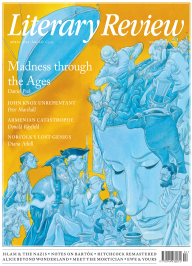Nick Holdstock
In Search of the Willow Palisade
In Manchuria: A Village Called Wasteland and the Transformation of Rural China
By Michael Meyer
Bloomsbury 365pp £20
When I first went to China, in 1999, no one I knew had been there. Most of what people claimed to know about the country was either a stereotype or hopelessly outdated: my grandmother asked me if they had telephones. Sixteen years later, it’s no longer unusual to spend a week (or a year) in Beijing, Shanghai or Kunming. The boom in tourism has made the country much better known, both to Chinese people and to foreigners. Yet the mostly rural interior of the country remains little visited and scarcely reported in foreign media; one rarely hears that someone went to Anhui, Henan or Hunan provinces on their holiday. Perhaps the least visited region is the northeast, whose three provinces (Liaoning, Jilin and Heilongjiang) are together the size of France and Germany combined, and with almost the same size population. I never visited any of these in the three years I lived in the country because I thought of them as freezing cold and remote, even by Chinese standards. I suspect the only reason I would have visited is that which initially drew Michael Meyer to the place: he was in love with a girl.
In Manchuria is primarily an account of the year he spent living in Wasteland, the village where his wife grew up. Meyer also travels widely in the region in search of traces of the region’s history, which is a palimpsest of transformations wrought by competing powers. The region used to

Sign Up to our newsletter
Receive free articles, highlights from the archive, news, details of prizes, and much more.@Lit_Review
Follow Literary Review on Twitter
Twitter Feed
Russia’s recent efforts to destabilise the Baltic states have increased enthusiasm for the EU in these places. With Euroscepticism growing in countries like France and Germany, @owenmatth wonders whether Europe’s salvation will come from its periphery.
Owen Matthews - Sea of Troubles
Owen Matthews: Sea of Troubles - Baltic: The Future of Europe by Oliver Moody
literaryreview.co.uk
Many laptop workers will find Vincenzo Latronico’s PERFECTION sends shivers of uncomfortable recognition down their spine. I wrote about why for @Lit_Review
https://literaryreview.co.uk/hashtag-living
An insightful review by @DanielB89913888 of In Covid’s Wake (Macedo & Lee, @PrincetonUPress).
Paraphrasing: left-leaning authors critique the Covid response using right-wing arguments. A fascinating read.
via @Lit_Review